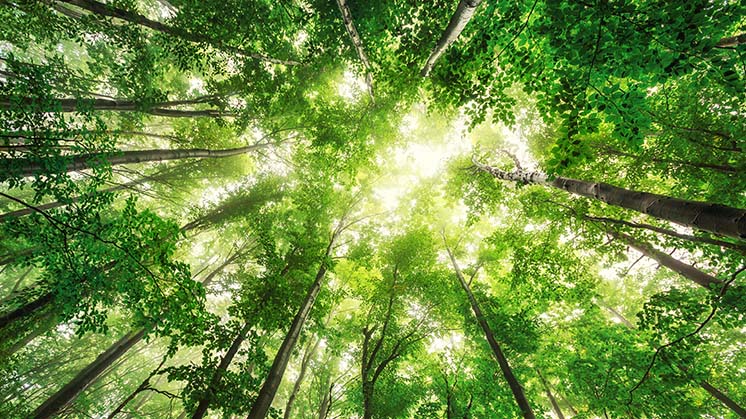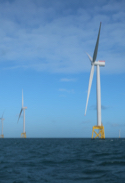21 March: International Day of Forests 2025
We take care of our forests to protect the planet
International Forest Day is celebrated on 21 March, a global initiative to highlight the importance of these ecosystems in the fight against climate change and to warn of the danger of their degradation. In line with this objective, at the Iberdrola Group we join in the conservation and restoration of forests with different programmes to ensure their survival.

Forests are considered the lungs of the planet. Trees purify the air by reducing CO2 and help regulate the climate. They are essential for sustaining life on Earth and play an important role in combating climate change. However, the threat of deforestation and degradation threatens the survival of forests worldwide. In order to raise awareness of their importance, 21 March is International Forest Day, a day that invites us to reflect on their importance and to commit ourselves to their preservation and care.
Fully aligned with this goal, we at the Iberdrola Group have integrated the conservation and promotion of the biological diversity of ecosystems into our strategy, a commitment that is materialised in the Biodiversity Policy and for which we have set an ambitious goal: to achieve zero net loss of biodiversity by 2030. In line with this world day, we reaffirm our commitment to ensure the preservation and restoration of forest stands with different initiatives. But why do we need to remember the importance of these ecosystems every year?
Theme for the International Day of Forests 2025
This year, the International Day of Forests 2025 is framed under the theme "Forests and Food", recognising the fundamental role of forests in food, nutrition and livelihoods, as they not only provide food, fuel, income and jobs, but also soil fertility, are home to a variety of animal species that support biodiversity and are important pollinators. It is a call to action to harness technological innovations for our forests to address the growing threat of deforestation, habitat degradation and climate change.
Key messages of this year's campaign include: Forests provide food, medicine and livelihoods to millions of people; more than 2 billion people depend on wood and other fuels for cooking; forests are essential for agriculture; they support rural incomes by boosting livelihoods and nutrition; they are vital for water, a necessary source for ecosystems and our food security and nutrition; forests serve as food safety nets in times of crisis; bushmeat from forests is a great source of protein and micronutrients.

International Day of Forests 2025: “Forests and food”.
Why is International Forest Day celebrated?
The Food and Agriculture Organisation of the United Nations (FAO) estimates that forests cover one third of the earth and are one of nature's great providers of essential functions for the preservation of the planet and life:
 They stem climate change
They stem climate change
Trees store carbon, which helps mitigate the impacts of climate change. It is estimated that the world's forests contain 662 billion tonnes of carbon, making up more than half of the world's carbon stocks found in soils and vegetation. They are also a natural air conditioner, lowering air temperatures by 2 to 8 degrees.
 They form a noise barrier
They form a noise barrier
Large forest stands dampen the sound waves of noise from roads, industries or urban centres.
 They are a source of water
They are a source of water
Forests provide 85% of the freshwater for the world's major cities.
 They provide energy
They provide energy
Woodfuels represent a potentially renewable and carbon-neutral energy source. FAO estimates that approximately 2.6 billion people rely on wood and other traditional fuels for household cooking.
 They are home to many species
They are home to many species
They play a key role in conserving life on the planet and are the most biodiverse terrestrial ecosystems, hosting 80% of the world's plant and animal species.
 They preserve our survival
They preserve our survival
More than 5 billion people use non-timber forest products for their own use or to support their livelihoods. In addition, forests enable and contribute to improving mental health and preventing disease.
 They strengthen environmental resilience
They strengthen environmental resilience
Forests, if managed sustainably, contribute to reducing soil erosion and the risk of avalanches, landslides and natural disasters.
Experts agree on the enormous ecological, economic and social benefits of forests, but deforestation and degradation threaten their conservation.
Raising awareness on deforestation and degradation
FAO defines deforestation as the conversion of forests to other land uses, such as agriculture, pastures, reservoirs and urban areas, and is the main risk to the future of these ecosystems. Deforestation is advancing at a rate of 13 million hectares per year and is responsible for 12-20% of greenhouse gas emissions that contribute to global warming, according to the FAO. This organisation estimates that since 1990, 420 million hectares of forest have been lost worldwide due to this threat which, although decreasing, is not decreasing at a sufficient rate to ensure the protection of the planet.
The other major threat to these ecosystems according to the World Wide Fund for Nature (WWF) is degradation, which is the reduction of the capacity of forests to provide goods and services after damage due to human activity (e.g., illegal logging, climate change) or natural (e.g., fire, pests).
International efforts are geared towards the protection and restoration of forests, with the aim of ending these threats and promoting their restoration to meet the Sustainable Development Goals (SDGs). Within the 2030 Agenda, SDG 15, point 15.2 speaks of the need to "promote the implementation of sustainable management of all types of forests, halt deforestation, restore degraded forests and significantly increase afforestation and reforestation globally".
We commit, we reforest, we care
At Iberdrola, we work to ensure the conservation of forest biodiversity and preserve flora, fauna and natural heritage through different programmes:
Our reforestation target: 20 million trees by 2030


We have a reforestation plan, the Árboles programme ("The Trees programme"), which promotes the planting of 20 million trees by 2030 —with a first goal of reaching 8 million by 2025—. This planting iniciative will capture approximately 6 million tonnes of CO2 in 30 years. This absorption of carbon dioxide would neutralise the emissions of a car circling the Earth 116 times. In the last few years, the Iberdrola Group has planted more than 2 million trees in seven countries.
This initiative is articulated in three branches:
 Conservation of natural heritage,
Conservation of natural heritage,
to mitigate and compensate for forest habitats affected by the occupation of new infrastructure. In 2020 and 2021, we planted two million trees in Brazil, Spain, Portugal, the UK, the US, Mexico and Greece.
 Regeneration and creation of natural value,
Regeneration and creation of natural value,
which will reverse the loss of forest mass by promoting initiatives that will enable planting on our own land or that of third parties. In 2022 we launched the challenge 'Innovation and sustainability in rural areas', in collaboration with Start-up Olé and with the support of the European Commission. A pioneering programme to promote the recovery of natural spaces in depopulated areas of Spain and Portugal through the conversion of burnt land or wasteland into forests.
 Research and awareness-raising,
Research and awareness-raising,
to promote shared knowledge and social value through the company's Volunteering Programme and support for R&D projects. Through volunteer actions, Iberdrola has already promoted the planting of more than 13,000 trees.
Out foundation's commitment
The work of foundations is also a fundamental axis for the care of forests. Through them, we promote specific initiatives committed to planting trees and conserving natural spaces.
-
The Fundación Iberdrola España develops various programmes to actively contribute to achieving the Sustainable Development Goals — especially SDG 13 (Climate action) and SDG 15 (Life on land) — by protecting birdlife, conserving natural habitats and disseminating actions that seek to raise awareness of climate change.
-
In Mexico, the Fundación Iberdrola México works on specific programmes for restoring ecosystems and projects for conserving flora and fauna species. An outstanding example of it is the action that the foundation is carrying out in the Cañón de Fernández State Park since 2019, focused on protecting the state park, preserving its ecosystem and benefiting local communities through sustainable ecotourism.
-
In its commitment to environmental protection and climate change, the Instituto Neoenergia actively contributes to improving biodiversity in Brazil's natural environments. Since 2015, the foundation has been carrying out important work in the conservation of migratory wader through the Flyways Brazil project.
-
The Trees for Like initiative, run by ScottishPower Foundation, aims to bring communities and landowners together to increase the natural capital of selected environments in the UK — creating sustainable nature-based economies. Along the River Endrick, for example, in northern Scotland, 2 kilometres of new woodland is being restores.
Committed to the environment and ecosystems

Pioneering the energy transition
Commitment to a clean, reliable and intelligent business model.

A benchmark in climate action
The fight against climate change has been at the heart of our strategy.

We respect the environment
We base our sustainable business model on the circular economy.

We protect natural ecosystems
We integrate the SDG 14 and SDG 15 to preserve life on land and underwater.
Questions and answers on
International Forest Day
On what date is it commemorated and when was the first one held?
International Forest Day is celebrated every 21 March. In 2012, the United Nations (UN) General Assembly agreed to commemorate this date, with 2013 being the first year it was celebrated worldwide. Although this was the first official recognition, there were already precedents. The International Day of Forests or World Forest Day was a recommendation of the World Forestry Congress held in Rome in 1969 and accepted by the Food and Agriculture Organization of the United Nations (FAO) in 1971.
Why was this date chosen?
The selection of the day is not accidental, as it coincides with the onset of spring in the northern hemisphere and autumn in the southern hemisphere.
Who organises the International Day of Forests?
The official organisers are the United Nations Forum on Forests, in collaboration with the Food and Agriculture Organisation of the United Nations (FAO), as well as the Collaborative Partnership on Forests, among others.
What is this year's theme?
Each year, the UN chooses a theme for the celebration of the International Day of Forests, which has so far addressed everything from the relationship of these green spaces with water or the city to the importance of environmental education. After more than 10 years of commitment, the theme for the International Day of Forests 2025 is "Forests and Food". In the current campaign, the UN highlights the relevance of forests for billions of people around the world, not only as a source of clean energy, but also as a source of food, fuel and livelihoods, and therefore deforestation and forest degradation must continue to be combated.
Where and how to celebrate? International Forest Day 2025 activities
The UN encourages countries to take initiatives at local, national and international levels to organise activities to promote the restoration of forests and trees, such as tree planting campaigns, or tasks that pay tribute to green spaces, such as art exhibitions or photo competitions. The organisation also encourages the adoption of any environmentally friendly activities that can be integrated into everyday life, for example recycling or reusing materials such as paper or plastic, avoiding bonfires - which emit greenhouse gases - or planting plants and trees to reduce the carbon footprint.




